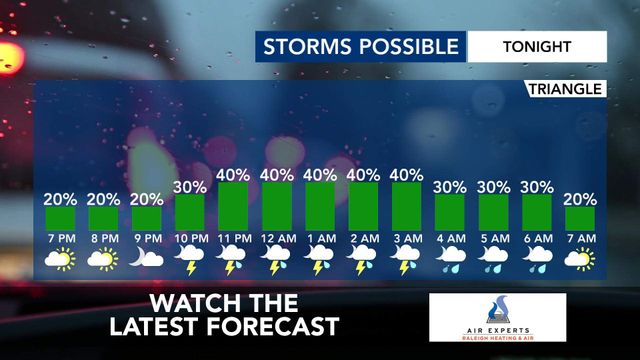School-choice PAC floods NC airwaves in heated US Senate GOP primary

A new political group bankrolled by a billionaire Wall Street investor is spending big money trying to influence elections across the country, including North Carolina, in an effort to shape how children are educated.
The Washington, D.C.-based School Freedom Fund is a proponent of school choice, a concept that promotes a variety of options for K-12 students, including magnet schools, home schooling, public charter schools and private schools.
Supporters of the movement think parents should receive taxpayer dollars to choose the educational environment that best suits their children. Critics say it’s an attempt to defund public schools and use public dollars for religious education.
School Freedom Fund has taken to North Carolina’s airwaves with ads focused on Republican candidates who are hoping to fill the seat of retiring U.S. Sen Richard Burr.
The group—backed almost exclusively by Jeff Yass, cofounder of options trading firm Susquehanna International Group—is among the biggest seeking to influence a hotly contested GOP primary in North Carolina that could tilt the balance of an evenly split U.S. Senate.
The political action committee has poured more than $1.3 million into the race in recent weeks to oppose former Gov. Pat McCrory, the main Republican competitor to GOP frontrunner U.S. Rep. Ted Budd.
Budd, a homeschool dad, supported a bill that would let parents “remove their child from school systems that teach anti-American curriculum,” including critical race theory, his campaign website says. It also says Budd “supports school choice and opportunity scholarships to give all students a chance to match their skills and interests with an education that best prepares them for the job market.”
During a debate on Wednesday, McCrory said, “Any future money in education needs to be targeted to where kids and adults can get jobs.” His website offers minimal insight into his views on education.
School Freedom Fund ads take aim at McCrory, claiming that he appointed Democrats to the state’s textbook commission — appointees who “mandated textbooks by radical, woke professors pushing critical race theory [and] teaching our kids to hate America.”
McCrory has called the claim “total deception.”
The commission cannot require books to be read in classrooms as the ad suggests. Rather, the commission reviews reading materials and makes recommendations to the state education board. If a book is approved by the board, local school districts then have the option to implement them.
Influential DC group behind school choice ads
Spending against McCrory by School Freedom Fund alone is 15% more than all the money the candidate’s campaign took in between Jan. 1 and March 31. And it’s only a fraction of what is being spent against the former governor, highlighting the uphill battle of a candidate facing attacks from groups with wealthy backers.
The School Freedom Fund is an extension of Washington, D.C.-based Club for Growth Action PAC, which itself has pledged to pour $14 million to support Budd in ads critical of McCrory.
“School choice has always been one of our seven or eight main themes that we stand for,” said David McIntosh, Club for Growth’s president. “We decided, let's set up a political arm to really help boost that school choice effort that a lot of other people have really been at the forefront of.”
Yass, a GOP megadonor, contributed $5 million within eight days of the fund’s formation in November 2021. And Yass, who didn’t respond to requests for comment, has plenty more to give. Forbes Magazine listed him as the 58th wealthiest American in 2021, with a net worth of $12 billion.
With the May 17 primary election approaching, School Freedom Fund has made itself the third largest outside spender in the GOP race, behind Club for Growth Action and an individual bankrolling a longshot candidate’s bid.
School Freedom Fund has also spent big in other states, including more than $500,000 to unseat U.S. Rep. David McKinley of West Virginia, more than $664,000 for Alabama U.S. Senate candidate Mo Brooks and nearly $500,000 to elect Nevada U.S. Senate candidate Adam Laxalt.
In North Carolina’s senate race, the fund’s influence is already being felt.
McCrory has dipped in the polls over the past two months, now trailing Budd, who was endorsed last year by former President Donald Trump. Since mid-March, ads supporting Budd and opposing McCrory have ramped up.
“If Budd hadn't had Club for Growth, this wouldn't even be a race,” McCrory said in an interview. “This has nothing to do with the Trump endorsement. It’s Club for Growth trying to buy the election for Ted Budd [and] buy the North Carolina Senate seat. The Club for Growth is really a couple of billionaires who are very pro-China.”

McIntosh said his organization is merely doing its part to give voters a choice.
“We're just doing our job, which is to give information to North Carolina voters, tell them the truth about the choices that are there,” he said. “McCrory was hoping that there wasn't anybody there that could get that information out and he could slide in because people remembered him from being governor. But our job is to educate the voters, tell them the truth [and] let them make a real choice.”
Budd’s top campaign adviser, Jonathan Felts, said Budd is ahead for another reason. “Pat McCrory is consistently inconsistent and North Carolinians are tired of it,” he said.
Who’s behind the ads?
Club for Growth Action, which has the greatest money influence in the North Carolina Republican Senate primary race, has spent about $11 million of the $14 million it pledged to boost.
As of March 31, the super PAC had raised nearly $40 million, according to campaign filings.
Richard Uihlein, the founder of a massive shipping supplies company, has donated more to conservatives this election cycle than any other individual in the U.S, campaign filings show. He has given $16.9 million to Club for Growth Action. He and his wife, Liz, have an estimated net worth of about $4 billion.
Yass has also donated $2.5 million to Club for Growth Action.
A committee bankrolled by a wealthy Wilmington voter is the second biggest spender in North Carolina’s Republican U.S. Senate primary. Through a group called Restore Common Sense, Inc., former pharmaceutical executive Fred Eshelman has spent more than $2.3 million to boost Army combat veteran and longshot candidate Marjorie K. Eastman, who has lagged in the polls.
A WRAL News online survey of likely GOP primary voters showed Budd with 33% support, McCrory with 23% and former U.S. Rep. Mark Walker with 7%. Eastman placed a distant fourth at 2%, and other polls have her even lower. One in three respondents said they were undecided. The poll, conducted from April 6 to 10, reported a margin of error of 5 percentage points.

During a Spectrum News debate Wednesday, Eastman took aim at the influence of outside spending. “We need to be worried about an election that’s being bought because that is what is happening right now here in our state by an outside group with dark money,” Eastman said.
School Freedom Fund, which has spent more than $1.3 million this year opposing former Gov. Pat McCrory, lists Club for Growth’s chief financial officer, Adam Rozansky, as its treasurer, and McIntosh, Club for Growth’s president, as the fund’s assistant treasurer.
But the new group isn’t the only one involved in North Carolina’s primary with ties to Club for Growth.
The fourth largest spender in the race is the Conservative Outsider PAC Inc., a group that received $1.05 million from Club for Growth Action a few days before placing a nearly $1 million ad buy attacking McCrory.
“Conservative Outsider PAC is really run by other people, and we support them,” McIntosh said. “Sometimes, we send money to help them do their mission.”
Ads draw ire from McCrory
McCrory is furious over recent ads taken out by Club for Growth Action and similar groups in recent weeks.
On Wednesday, the political action committee launched a $1.5 million ad campaign touting Lt. Gov. Mark Robinson’s support of Budd.
In the ad, Robinson criticizes McCrory for appointing Democrats onto the state’s textbook commission, much like the School Freedom Fund ads. The ads also pay oblique reference to critical race theory.
CRT is a high-level academic framework legal scholars developed in the 1970s and 1980s that emerged in response to frustration among some with a lack of racial progress during the 1960s. In 2020, it became a lightning rod issue for conservatives and has morphed into somewhat of a catchall phrase to describe racial teachings in K-12 classrooms and other materials parents and GOP policymakers find objectionable.
The governor has the power to appoint commission members, but state law dictates that the selections come from the state superintendent of public instruction, who was a Democrat throughout McCrory’s gubernatorial tenure from 2013 to 2017. The superintendent was elected in a statewide race.
The governor is allowed to reject the superintendent’s nominee, according to Blair Rhodes, a spokeswoman for the state’s Department of Public Instruction. However, “what the governor can’t do is approve someone who has not been recommended by the superintendent.”
McCrory didn’t dispute the party affiliations of commission members but said his involvement was “basically a formality” and came years before critical race theory became a hot-button issue among conservatives starting in the leadup to the 2020 presidential general election.
“At that point in time, this issue wasn't an issue,” McCrory said. “I don't recall CRT even being a term used at the time.”
McIntosh said McCrory should have been more aware of the subject during his governorship.
“He was so out of tune with what was happening on the left that he let it sneak in right under his nose,” McIntosh said.
McCrory’s disdain for the ads, and his insistence that they’re unfair and misleading, belie his acknowledgement that they might be effective enough to keep him down in the polls.
“I saw a commercial by the Club for Growth recently about me, and after watching it, I decided to vote against me, briefly,” McCrory said. “I mean, that's how bad the ads are. It’s an embarrassment.”
WRAL State Government Reporter Paul Specht and WRAL Education Reporter Emily Walkenhorst contributed to this article.












